- Home
- Sherry Thomas
Ravishing the Heiress ft-2 Page 3
Ravishing the Heiress ft-2 Read online
Page 3
Helena was not pleased at the prospect of the at-home tea. “Lady Margaret Dearborn runs with the horse-and-hound set. Her guests never talk about anything but the fox hunt.”
“You’ve published a memoir on fox hunting, if I recall.”
“Published on commission at no risk to me, or I’d never have taken it on.”
“Still, that gives you something to talk about with the horse-and-hound set.” Millie raised herself to her toes and kissed Helena on her cheek. “Your carriage awaits, my love. I will see you in the afternoon.”
“Wait,” said Helena. “Is it true what I hear? That Mrs. Englewood is back in England?”
Mille ignored the pang in her chest and nodded. “Fitz will be calling on her this afternoon. Quite a momentous day for them, isn’t it?”
“I imagine.” The question in Helena’s eyes, however, was not about Fitz, but about Millie.
Millie was never possessive, never effusive, and never demonstrative. Her even-tempered approach to her marriage should have been enough to convince everyone that she admired, but did not love, her husband. Yet for years now, his sisters had suspected something else.
Perhaps unrequited love was like a specter in the house, a presence that brushed at the edge of senses, a heat in the dark, a shadow under the sun.
She patted Helena on the arm and walked away.
T he garden had come to life.
The grass was as green as a river bank, the trees tall and shady. Birds sang in the branches; the fountain trickled and murmured. In a corner of the garden, purple hydrangeas were in bloom, each flower head as big and bright as a nosegay.
Have a garden, Mrs. Graves had counseled Millie on her wedding. A garden and a bench.
Millie spread her fingers on the slats of the bench. It was simple but handsome, made of oak and varnished a light, warm brown. The bench did not belong to her; it had been here for as long as she’d been Fitz’s wife. But at Henley Park, there was an almost exact replica, which Fitz had given her a few years ago, as a token of his regard.
And she’d seen it as such a sign of hope—more fool she.
“I thought you might be here,” said her husband.
Surprised, she looked over her shoulder. He stood behind the bench, his hands lightly resting on its back—the same elegant hands that had turned music for her while his words had turned her inside out.
Now on his right index finger, he wore a signet ring the crest of which bore an intaglio engraving of the Fitzhugh coat of arms. The ring had been a present from her. The sight of it on his hand had stirred her then and stirred her still.
She wanted to touch it. Lick it. Feel its metallic caress everywhere on her body.
“I thought you’d already left.”
From her perch upstairs, she’d watched him stroll away. It was early yet, hours from his meeting with Mrs. Englewood. But as he’d turned the corner, he’d swung his walking stick a full circle in the air. That, coming from him, was the equivalent of another man dancing in the streets.
“I realized I will be going past Hatchard’s today,” he said. “Would you like me to check whether your order of books has come in?”
“That’s very kind of you, but surely, you have a busy day ahead and—”
“It’s settled, then: I’ll have a quick word with the bookseller.”
“Thank you,” she murmured.
He smiled. “My pleasure.”
She’d mentioned the special order she’d put in at Hatchard’s once, days ago. That he’d remembered and offered to check for her would have thrilled her another time—she’d have taken it as yet another sign that they were growing ever closer.
Today his consideration only signified that he himself was gloriously happy at the prospect of seeing his beloved. He was summertime itself, young, luminous, lit from within by rekindled hopes and reawakened dreams. And every beggar along his path—herself included—could expect redoubled generosity and kindness.
He turned to leave but stopped. “I almost forgot, you ought to be more mindful of your intake of salt—you put enough into your scrambled eggs to preserve them for the next decade.”
And then he was gone, leaving her alone in the garden.
F itz stood outside Isabelle’s house.
He thought he’d learned to be levelheaded, but every emotion that tumbled through him was unrestrained, heart-stopping. Second chances—not many received such graces, and even fewer were in a position to seize them with both hands.
Dread and hope pulsed in his blood with equal intensity. So many years had passed. He’d changed. She, too, must have changed. Would they even have anything to say to each other when they came face-to-face?
He rang the bell. A maid in a large white cap and a long white bib opened the door, took his card, and asked him to follow her into the house. He stopped, however, in the vestibule, empty except for a rectangular mirror and a narrow console table underneath. A silver tray for calling cards sat on the table. Beside it, an instantly recognizable photograph.
He had a copy of the same photograph somewhere in the depths of his dressing room. It had been taken near the end of his first stay at the Pelham house, the ladies in their Sunday finery seated in the front row, the gentlemen, a solemn-looking lot, standing behind them. He himself looked impossibly young; Isabelle was uncharacteristically demure, her hands folded chastely in her lap.
But those hands concealed a secret. Directly after the photographer pronounced himself satisfied, she’d pulled Fitz aside and given him what she’d been stowing in her pocket: a tiny dormouse she’d named Alice. Alice had been the perfect pet for a busy student: She hibernated for much of Michaelmas Half and all of Lent Half, emerging only in April to live in his pocket on a delicate diet of berries, nuts, and an occasional caterpillar.
“I always keep that photograph close to me,” said a familiar voice. “It’s the only one I have of you.”
He set down the photograph and carefully, slowly, turned toward her.
Isabelle.
She was both taller and leaner than he remembered—and not eighteen anymore. Her face had settled into a somewhat harsher shape. There was tension to the contour of her jaw. Her skin seemed to require a greater effort to stretch over her features.
But those features were as chiseled and proud as ever. Her hair was the same blue black. The fire in her eyes remained undiminished. And in the intensity of her gaze he recognized the Isabelle Pelham of yesteryear.
And at the sight of her, long-lost memories, recollections that had become as faded as pages in an ancient manuscript, suddenly reacquired color, brightness, and focus. Isabelle in spring, holding an armful of hyacinths. Isabelle in her white tennis dress, waving her racquet at him, her smile brighter than the sun shining on the deep green lawn. Isabelle crunching fallen leaves underfoot, turning occasionally to say something to her governess, who trailed several steps behind them, and whom he barely noticed, because he had eyes only for his girl.
“Mrs. Englewood,” he said. “How do you do?”
“Fitz, my goodness,” she murmured. “You are exactly as I remember you. Exactly.”
He smiled. “I still look nineteen?”
“No, of course not. You are a man full grown. But the essence of you has not changed at all.” She shook her head slightly, as if in wonder. “Come, we can’t hold a conversation in a passage. Let’s sit down.”
The tea things had already been laid out in readiness. Isabelle poured for them both.
“Tell me everything,” she said.
“Tell me about India,” he said at the same time.
They both smiled. He insisted that she regale him first with her stories, so she did. Delhi was unbearably hot in the month of April. Kashmir was very likely the most beautiful place on earth, especially Srinagar on the shores of Dal Lake. And she enjoyed the food of Hyderabad the best. He, in turn, gave her the latest on their mutual friends and acquaintances: courtships, marriages, children, and scandals minor and majo
r.
An hour flew by.
Eventually she lifted her teacup and looked at him. “You haven’t said a thing about yourself, Fitz. How have you been?”
How had he been? “I can’t complain,” he said.
Isabelle’s gaze was fluid and just slight mocking. A smile played at the corners of her lips. How well he recalled this particular expression on her—she was about to say something naughty. “I hear you have been very successful with the ladies.”
He lowered his gaze. Between the two of them, he’d always been the shyer one. “It’s a way to pass time.”
A way to cope—and to forget.
“Lady Fitzhugh is very understanding, then.”
“She’s always been very sensible.”
“When I was still in India I’d heard it said that the two of you got on very well. I hadn’t quite believed it—but I guess it’s true.”
At last they came to it, the subject of his marriage. Her face turned somber, her gaze that of one regarding a friend’s tombstone.
“For someone who had no say in the matter,” he said, “I’ve been fortunate in the wife I’ve been allotted.”
“So…you are glad you married her?”
He did not look away this time. “I didn’t say that. You know I’d have crawled over broken glass to marry you, had the circumstances been different.”
“Yes,” she said, her voice unsteady. “Yes, I know that.”
The front door of the house opened and in wafted the sounds of children at lively chatter, followed by a quick “shhh” from their minder.
“Excuse me a moment,” said Isabelle. She left the parlor and came back with a boy and a girl. “May I present Hyacinth and Alexander Englewood. Children, this is Lord Fitzhugh, an old friend of Uncle Pelly’s and Mama’s.”
Hyacinth was six, Alexander a year younger, both beautiful, both with their mother’s coloring. Suddenly, Fitz couldn’t speak. Had things been different, they would have been his children, and would not regard him with solemn, curious wariness, but run to him with open arms and wide grins.
They stayed only a minute before leaving for the recesses of the house with their governess. Isabelle lingered a moment at the door, her eyes following them. “They grow up so fast.”
Fitz swallowed a lump in his throat. “You always did like the names Hyacinth and Alexander.”
“I did. Hyacinth and Alexander Fitzhugh,” she murmured, a sheen of tears in her eyes.
She retook her seat. The sun streaming in from the open curtains sparkled on the gold trim of the saucers. She turned her cup round and round on its saucer—she was never one for staying still.
And then she looked at him, bold, resolute, Isabelle as he’d always remembered. “Is it too late to reclaim some of what we could have had?”
As if she had to ask. As if he hadn’t been thinking of the very same in the weeks since her first letter arrived. As if he wouldn’t hold on to this rare, priceless second chance with both arms and never again let go.
“No,” he said. “It’s not too late.”
CHAPTER 3
The Pact
1888
A fortnight after the dinner, lawyers from both sides sat down once more at the negotiating table. But while the new earl had capitulated to the demands of his estate, the price he asked for his surrender was as steep as the Matterhorn.
Such was the influence of youth and beauty that Mr. Graves barely grumbled over having to pay nearly twice as much for this earl. The negotiations concluded quickly and Millie once again found herself engaged to marry.
Throughout it all, she never once heard from Lord Fitzhugh himself. There were no notes, no flowers, and no engagement ring. Citing his studies, he declined a second dinner with the Graves. For the Fourth of June, the biggest holiday at Eton, a time when friends and family flocked to the school, the Graves received not a single invitation to participate in the festivities.
And why should he act differently? Were Millie Lord Fitzhugh, she, too, would furiously enjoy the final days of her freedom and waste not a precious second on those to whom she’d soon be shackled for the rest of her life.
But understanding why he was so distant only made things worse. When she wasn’t buffeted by misery, she was overcome with shame. To him, she would always symbolize everything that was unappealing about coming of age: the crushing pressures of duty, the paucity of choices, and the appalling necessity to forgo dreams to pay creditors.
No aloofness on Lord Fitzhugh’s part, however, could dissuade Mrs. Graves from dragging Millie to Lord’s Cricket Ground on the day of the Eton and Harrow game.
Cricket was popular, a pastime enjoyed by young and old, gentlemen and laborers. More easygoing parsons sometimes joined their parishioners for a Sunday afternoon match. And certainly it was the dominant game in the lives of schoolboys.
The Eton and Harrow game at Lord’s, however, was not a sporting event. Or rather, the sporting event was but an excuse for all of Society to gather for a merry daylong picnic under a fair summer sun. And since no invitations were needed at Lord’s, it was also one of the few opportunities for the merely rich to rub elbows with the blue-blooded.
For that reason, Mrs. Graves always began planning for what she and her daughter would wear to the grand event months in advance. But two years in a row, they’d had to abstain, first because of the passing of Millie’s maternal grandfather, then due to severe abdominal troubles that had left Mr. Graves in need of his wife’s and daughter’s tender attention.
This year, with no one expiring and no one remotely under the weather, Millie could only watch helplessly as Mrs. Graves, in a burst of energy, orchestrated the outing.
On the first day of the match, their beautiful landau, its boot laden with picnic baskets, was dispatched to St. John’s Wood before the crack of dawn, to secure a place for the ladies at the side of the cricket ground. The ladies themselves, however, did not leave the house until eleven o’clock, arrayed in the latest gowns from Worth’s Paris atelier.
Cricket was not the point. The point was to see and be seen—and that was best done during the luncheon hour.
They arrived just as the players were walking off the field. With an alacrity that belied her complaints of arthritic joints, Mrs. Graves leaped down from the second-best carriage that had conveyed them to the outskirts of the cricket ground, which was now ringed by carriages three, sometimes, five deep. Pulling Millie along, she joined the great stampede of spectators making for the playing field that the two teams had just vacated.
The sky was a flawless blue, the clipped lawn a lively green. Thousands of ladies in their spring best milled about, splashes of pastels everywhere one looked, set off all the better against the somber black of the gentlemen’s day coats, like gems upon the dark velvet of a jewelry box.
It was a marvelous sight, if one were of the mind to enjoy the day. Millie was not. She’d never been one to relish public attention, especially not the kind of sidelong glances she gathered in her extravagant clothes that were beyond the means of many wellborn ladies. Worse, Mrs. Graves had turned into Parvenu Mother.
Mrs. Graves was not normally Parvenu Mother: She was proud of the haute bourgeoisie respectability from which she came. Social climbing was never foremost on her mind. She did it out of duty to her husband’s kin, especially his dead father and brother, both of whom had longed fiercely to ally the family with noble blood.
But this particular occasion seemed to turn her head. She informed everyone who would stand still that her daughter, paired with the winsome Lord Fitzhugh, was going to take Society by storm. Oh, my Millie has the most charming figure on the dance floor. Oh, my Millie has the most captivating way with conversation. Oh, the worst snobs among them will admire my Millie and she will be invited everywhere.
Millie’s protestation of her mediocre appeal only made Mrs. Graves scale ever greater heights of hyperbole.
Finally Mrs. Graves ran into an old friend who knew all about Millie�
��s imminent ascension as the Countess Fitzhugh and who was already convinced that Millie would set a new standard of popularity as a Society hostess. As a result, their conversation revolved around Millie’s trousseau, her wedding breakfast, and her honeymoon.
As Mrs. Graves waxed poetic about a honeymoon in Rome, which she herself would have enjoyed, were it not for Mr. Graves’s virulent objection to eating nothing but macaroni for two continuous weeks, the crowd shifted, revealing Lord Fitzhugh.
He stood amidst a flock of uniformed Eton students and their butterfly-bright sisters. There were at least five girls, but he had eyes only for one, a beautiful young lady with jet-black hair and lips of the loveliest pink Millie had ever seen, the color of Mrs. Graves’s prize peonies.
Millie was envious, but not overly alarmed at first: It was only too normal for a young man’s attention to be drawn to a beautiful young woman. Then she saw that the earl’s gaze was not one of mere interest, but of desperate yearning, as if he were a prisoner in his cell, staring at the tiny square of sky allotted him.
It shattered Millie. For all her hair-rending over his reluctance to marry her, she’d yet to consider that he might be in love with someone else. But he was, wasn’t he, desperately in love? And desperately unhappy for the loss of his beloved.
She was frantic to hide herself. He must not see her. He must not think that she’d come to be near him. And he must never, never know that she felt anything for him besides a polite obligation.
God heard her prayers: The warning gong sounded. Millie tapped Mrs. Graves on the sleeve. “The game is to resume soon, Mother. Shall we return to our carriage?”
Mrs. Graves scoffed at her suggestion. “No one gets off the field until at least the second gong.”
A look around showed that, unfortunately, Mrs. Graves was right. The happy crowd remained firmly affixed. Laughter boomed like artillery shots all around her, each one leaving a new dent on her heart.
She glanced toward the earl, hoping he hadn’t seen her. But just then he looked in her direction. Their eyes met. And the expression on his face—a recoil of the soul—told her everything she already knew and could no longer deny.

_preview.jpg) Claiming the Duchess (Fitzhugh Trilogy Book 0.5)
Claiming the Duchess (Fitzhugh Trilogy Book 0.5)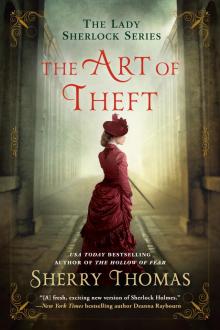 The Art of Theft
The Art of Theft The Magnolia Sword: A Ballad of Mulan
The Magnolia Sword: A Ballad of Mulan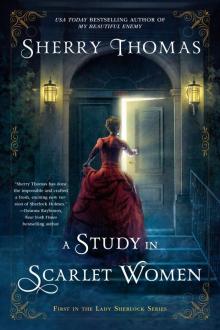 A Study In Scarlet Women
A Study In Scarlet Women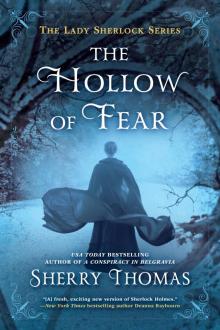 The Hollow of Fear
The Hollow of Fear The Magnolia Sword
The Magnolia Sword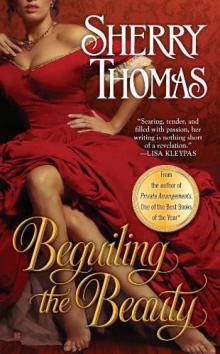 Beguiling the Beauty ft-1
Beguiling the Beauty ft-1 The Heart is a Universe
The Heart is a Universe The Hidden Blade: A Prequel to My Beautiful Enemy (Heart of Blade)
The Hidden Blade: A Prequel to My Beautiful Enemy (Heart of Blade)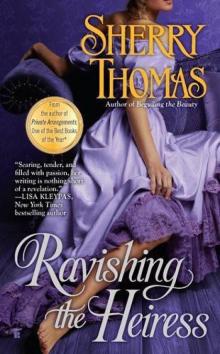 Ravishing the Heiress ft-2
Ravishing the Heiress ft-2 The Immortal Heights
The Immortal Heights The Hidden Blade
The Hidden Blade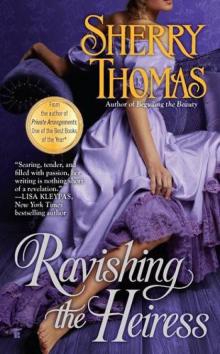 Ravishing the Heiress
Ravishing the Heiress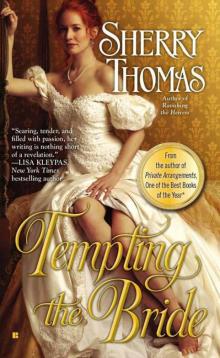 Tempting the Bride
Tempting the Bride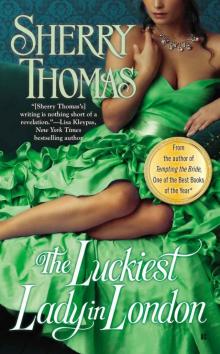 The Luckiest Lady in London
The Luckiest Lady in London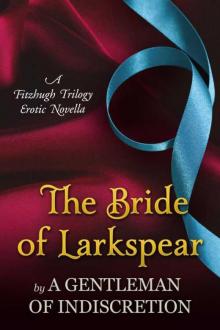 The Bride of Larkspear: A Fitzhugh Trilogy Erotic Novella
The Bride of Larkspear: A Fitzhugh Trilogy Erotic Novella Claiming the Duchess
Claiming the Duchess The One in My Heart
The One in My Heart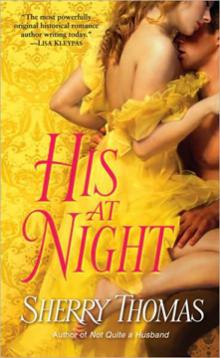 His At Night
His At Night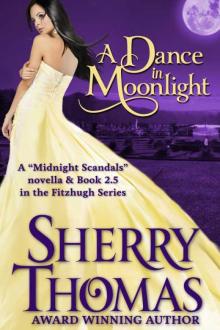 A Dance in Moonlight
A Dance in Moonlight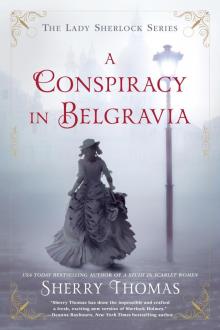 A Conspiracy in Belgravia
A Conspiracy in Belgravia Not Quite a Husband
Not Quite a Husband